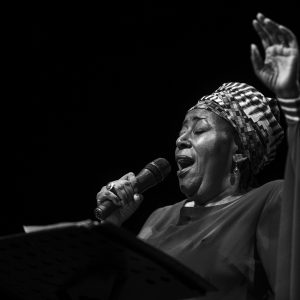The profound instrument: Sibongile Khumalo’s voice
Listening to the vocalist who elevated the traditions of South African music and refused to be confined to one genre is to appreciate the nuances of the voice as an instrument.
Author:
9 February 2021

It is strange to talk about Sibongile Khumalo in the past tense. She has been a constant presence in South African popular culture, somehow eternal. Khumalo worked to preserve the classics in jazz, traditional music, gospel and opera, innovating beyond the boundaries of genre and demonstrating the voice as an instrument.
She sat at the feet of Princess Magogo kaDinuzulu – a composer of Zulu traditional music – and her love for it was incubated under the mastery of her cultural activist parents, musician and professor Khabi Mngoma and her mother, Grace. Khumalo was one of the few artists whose voice could traverse genres with extraordinarily little effort and superior intonation.
Khumalo began her formal career with the opera Carmen in the 1980s. But it was in 1996 when she released the album Ancient Evenings under Sony Music that the singer started to cement herself as a musical icon. Each album she produced over the next 25 years gave listeners a fresh entry point into the power of her voice and its refusal to be pinned down.
Related article:
As a student of music, among other art forms – she was also an actress – Khumalo concerned herself with elevating the traditions of South African music through the voice. Having sung at the inauguration of President Nelson Mandela, she was an artistic symbol of the democratic era, sometimes referred to as “the voice of the new South Africa”. She was at the forefront of a generation of artists who sang uncensored.
In several of her songs Khumalo sings history to life, bringing to the new era the songs and erased spaces of Sophiatown and exile in the 1960s. In Under the Cover of Darkness from Immortal Secrets (2000) – which would never have been released under apartheid – Khumalo’s voice roots itself in the middle to lower registers of her range for dramatic effect. Thula Mama from Ancient Evenings is a nod to Miriam Makeba. She also lent her voice to an interpretation of Winston Mankunku’s legendary Yakhal’Inkomo, connecting a new generation with our musical heritage while shaping future sounds. As a scholar and performer, Khumalo was always mindful of her art being part of a cultural project.

The nuances of voice
Listening to Khumalo is to appreciate the nuances of the voice as an instrument, how it pulses between loud and soft, and across tone, pitch and resonators. Several songs in her catalogue have repetitive lyrics, but her turns of phrase and changes in tone and texture allow the listener to experience the meaning of the line anew. This is obvious in her collaborations with composer, bassist and songwriter Victor Ntoni, specifically in Seliyana or in the refrain of the gospel classic We Bathandwa from Quest (2006).
Khumalo could scat in the vein of Ella Fitzgerald, as though she were an actual instrument accompanying the piano – especially in the live performance of her version of Mountain Shade. If you thought her studio recordings were sublime, her live performances were a display of her deep understanding of arrangement and how at home she was in the world of improvisation.
Khumalo has been an important figure for reimagining opera in the African context – not just with Black women and men taking the stage as leads for well-known classics, but also in the creation of operatic works that tell African stories. Khumalo became the face and the voice of the epic portraying the life of Princess Magogo in an opera named after the Zulu royal.
She has commanded the compositions of Johannes Brahms, including his Alto Rhapsody, which deals with freedom – an apt choice for the vocalist. She also circled back to the works of 20th-century African composers such as Benjamin Tyamzashe. Khumalo constantly worked to root herself within a line of African composers concerned with making choral and classical music for the appreciation of Black audiences.

Khumalo was an educator who appreciated and worked with the voice as though it were a handmade instrument. Her voice box was a treasure trove of the mastery of homegrown genres and her legacy lies in daring to explore the beauty of African vocal work.
The lines, “Nkos’ uphile, uphind’ uthathe. Yebo manje siyakhala. Awu, Xola Moya. [We have lost someone. We are in the midst of grief, crying. We ask for peace to be upon us.]” from Khumalo’s Xola Moya expresses the tragedy of loss. We can only hope to find some peace in Khumalo’s profound legacy.

